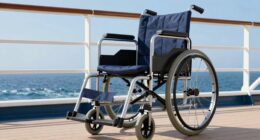I’m excited to share some wonderful news! The U.S. District Court has granted a preliminary injunction against the CDC’s Cruise Ship Guidelines, representing a major victory for Florida.
Starting July 18, cruise ships departing from Florida ports will no longer be bound by the CDC’s Conditional Sailing Order (CSO) and the rules will be reduced to recommendations.
This ruling comes after criticism of the CDC’s slow progress, burdensome instructions, and failure to consider the impact of vaccines.
It’s a game-changer for the cruise industry, potentially allowing more ships to resume operations faster.
Key Takeaways
- U.S. District Court grants preliminary injunction against CDC’s Conditional Sailing Order (CSO)
- Cruise ships departing Florida ports will no longer have to follow CSO rules starting July 18
- CDC’s order faced criticism for slow progress in the return of cruising and burdensome instructions
- Judge highlights high vaccination rates, containment measures, and success of other industries as reasons for ruling against CDC
Judge’s Ruling: Preliminary Injunction Granted Against CDC’s Cruise Ship Rules
I’m thrilled that the judge has granted a preliminary injunction against CDC’s cruise ship rules. This means that cruise ships departing Florida ports will no longer have to follow the CSO rules starting July 18.
This ruling has a significant impact on the cruise industry and marks a legal win for Florida. The judge’s decision suggests that Florida is likely to prevail in its claim that the CDC exceeded its authority.
The CSO rules will now be reduced to recommendations for safe sailing, giving the cruise industry more flexibility. This ruling also brings to light criticisms of the CDC’s Conditional Sailing Order, including its slow progress and burdensome instructions.
Overall, this ruling sets a precedent for other states and industries, highlighting the importance of balancing public health measures with individual freedoms.
Florida’s Legal Win: Likely to Prevail in Claim Against CDC’s Authority
It’s likely that I will prevail in my claim against the CDC’s authority.
Florida’s legal win against the CDC’s cruise ship rules marks an important turning point in the ongoing legal battle. The U.S. District Court’s ruling granting a preliminary injunction acknowledges that the CDC exceeded its authority with the Conditional Sailing Order (CSO).
The impact of this ruling is significant:
-
Cruise ships departing from Florida ports will no longer be bound by the CSO rules starting July 18. Instead, the rules will be reduced to recommendations, giving the industry more flexibility.
-
The criticisms against the CSO were numerous. The CDC’s slow progress, delayed instructions, and failure to consider the prevalence of vaccines were all seen as burdensome for the cruise industry. No cruise ship has departed the U.S. with paying passengers since the order’s implementation.
-
The judge’s criticism of the CDC’s actions further strengthens Florida’s case. The ruling highlights the lack of evidence showing that cruise ships amplify COVID spread. The judge emphasizes the success of other industries, high vaccination rates, and containment measures in the U.S.
This legal win has significant implications for the cruise industry. The CDC has the opportunity to propose a narrower rule by July 2, potentially allowing more ships to resume operations faster. The ruling is seen as a victory for Florida and the cruise industry, preserving states’ rights against federal overreach.
The legal proceedings are expected to continue in the future, with further steps and developments anticipated. While the ruling is not set in stone and changes or appeals may occur, it signals a positive trajectory for Florida’s claim against the CDC’s authority.
Rule Change: Cruise Ships Departing Florida Ports No Longer Bound by CSO
Starting July 18, cruise ships departing from Florida ports will no longer have to follow the Conditional Sailing Order (CSO) rules. This rule change is expected to lead to a faster resumption of cruise operations and could have a significant impact on the profitability of the cruise industry. The CSO rules, which were put in place by the CDC, have faced criticism for their slow progress in allowing the return of cruising. The industry argued that the rules did not take into account the prevalence of vaccines and the success of other industries in safely operating. With the removal of the CSO rules, more ships could potentially resume operations faster, allowing the cruise industry to recover and potentially improve its profitability.
| Pros | Cons |
|---|---|
| Faster resumption of cruise operations | Potential concerns over health and safety protocols |
| Increased revenue for the cruise industry | Potential legal issues and liabilities |
| Boost to local economies and tourism | Uncertainty over passenger demand and confidence |
| Potential job creation and employment opportunities | Potential reputational damage in case of COVID outbreaks |
| Enhanced customer satisfaction and loyalty | Potential impact on the environment and local ecosystems |
From Rules to Recommendations: CDC’s Conditional Sailing Order Revised
The revision of the Conditional Sailing Order by the CDC changes the rules for cruise ships departing from Florida ports, shifting them from mandatory requirements to mere recommendations for safe sailing.
This revision has significant implications for the cruise industry operations. The CDC’s revised recommendations mean that cruise ships will no longer be bound by strict rules and protocols set forth in the CSO. Instead, they will have the option to follow these recommendations, which may provide more flexibility for the industry.
This change could potentially expedite the resumption of cruise operations as ships may no longer need to undergo simulated cruises or obtain CDC approval. However, it is important to note that legal proceedings between Florida and the CDC are ongoing, and further developments in the case are expected.
The impact of this revision on the cruise industry remains to be seen.
Criticisms of CDC’s Order: Slow Progress and Burdensome Instructions
I find the criticisms of the CDC’s order to be valid. The slow progress in the return of cruising and burdensome instructions have hindered the industry’s recovery.
The CDC’s order has faced backlash for its lack of progress in allowing cruise ships to resume operations. The industry has argued that the instructions from the health agency have been delayed and difficult to navigate. Additionally, the order has been criticized for not taking into account the prevalence of vaccines and the success of other industries in implementing safety measures.
Since the implementation of the order, no cruise ship has departed the U.S. with paying passengers, and only a few ships are scheduled to sail within the next two months. The CDC’s slow progress and burdensome instructions have undoubtedly impacted the recovery of the cruise industry.
Lack of Evidence: Judge Questions CDC’s Claim of Cruise Ship Amplification
As an industry observer, it is concerning that the CDC fails to provide evidence for their claim that cruise ships amplify the spread of COVID-19.
The recent ruling by the U.S. District Court highlights this concern and questions the validity of the CDC’s assertion. The judge’s criticism raises important points regarding the lack of evidence presented by the CDC, especially when compared to the agency’s approach with other industries.
It is worth noting that the CDC did not shut down other industries but offered recommendations for safe operation. The judge emphasizes the success of these industries and the availability of vaccines and testing, suggesting that the threat of COVID-19 is no longer as significant as it was at the start of the pandemic.
This raises further doubt about the CDC’s claim and the need for such stringent regulations on the cruise industry.
Implications for the Cruise Industry: Faster Resumption of Operations?
Given the recent ruling and the potential elimination of certain regulations, the cruise industry may be able to resume operations more quickly than anticipated. This is significant for the industry’s revival, as it has been severely impacted by the COVID-19 pandemic.
The ruling grants a preliminary injunction against the CDC’s Conditional Sailing Order (CSO), stating that Florida is likely to prevail in its claim that the CDC exceeded its authority. As a result, cruise ships departing from Florida ports will no longer have to follow CSO rules starting July 18, and the rules will be reduced to recommendations for safe sailing.
This means that the industry may no longer need to conduct simulated cruises and obtain CDC approval, potentially allowing more ships to resume operations faster. However, it is important to note that legal proceedings are expected to continue, and further developments are anticipated in the future.
Reactions to the Ruling: Florida’s Victory and Federal Overreach Concerns
The ruling has sparked concerns about federal overreach and its potential impact on the cruise industry. Many view Florida’s victory in the injunction against the CDC’s cruise ship rules as a preservation of states’ rights.
The decision has brought to light the debate surrounding the role of federal agencies in regulating the industry. Critics argue that the CDC’s Conditional Sailing Order (CSO) imposed burdensome and delayed instructions, hindering the return of cruising. They also question the CDC’s evidence for claiming that cruise ships amplify the spread of COVID-19.
With the ruling, the industry hopes for a faster resumption of operations, as cruise ships departing Florida ports will no longer have to follow CSO rules. However, legal proceedings are expected to continue, and further developments in the case are anticipated.
Frequently Asked Questions
What Were Some of the Criticisms of the Cdc’s Conditional Sailing Order?
The criticisms of the CDC’s Conditional Sailing Order included a lack of data and overreach. Critics argued that the order was burdensome, didn’t consider vaccination rates, and didn’t provide evidence that cruise ships amplify COVID spread.
Has Any Cruise Ship Departed From the U.S. With Paying Passengers Since the Implementation of the Cso?
No cruise ship has departed the US with paying passengers since the implementation of the CDC’s rules. The impact of these rules on cruise ship departures has been significant, causing delays and frustration in the industry.
What Were Some of the Judge’s Criticisms of the Cdc’s Actions?
The judge criticized the CDC’s overreach and lack of scientific evidence. He highlighted that the CDC didn’t shut down other industries and that COVID-19 no longer poses the same threat as before.
What Options Does the CDC Have in Response to the Judge’s Ruling?
The CDC has the option to propose a narrower rule by July 2. This ruling could potentially allow more cruise ships to resume operations faster, without the need for simulated cruises and CDC approval.
How Did Governor Ron Desantis and Others React to the Judge’s Ruling?
Governor Ron DeSantis celebrated the judge’s ruling, claiming victory for Florida and the cruise industry. Others accused the CDC and the Biden Administration of trying to sink the industry. Legal proceedings are expected to continue.









